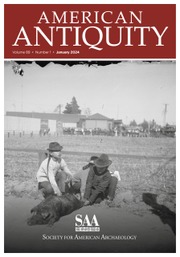No CrossRef data available.
Article contents
Some “Palaeolithic” End-Scrapers from Southern Oklahoma
Published online by Cambridge University Press: 25 January 2017
Extract
During the course of a survey of surface manifestations in the region of Piatt National Park, Oklahoma, the writer's attention was called to the distinctive form of scraper occurring in sites between Buckhorn and Oil Creek, streams heading four and eight miles south of the Park, respectively.
The two creeks are outlets of underground waters from the numerous caves of that locality. The waters are clear, cold and palatable, and the banks of the creeks were favorite locations for camps of prehistoric peoples, if one can judge by the thousands of flint chips that cover the surface. The streams empty within twelve miles into the False Washita, a river whose geological history goes far back into Palaeozoic times.
- Type
- Facts and Commments
- Information
- Copyright
- Copyright © The Society for American Archaeology 1939
References
52 Nelson, N. C. Notes on Cultural Relations Between Asia and America., American Antiquity, Vol. 2, No. 4, p. 258.


